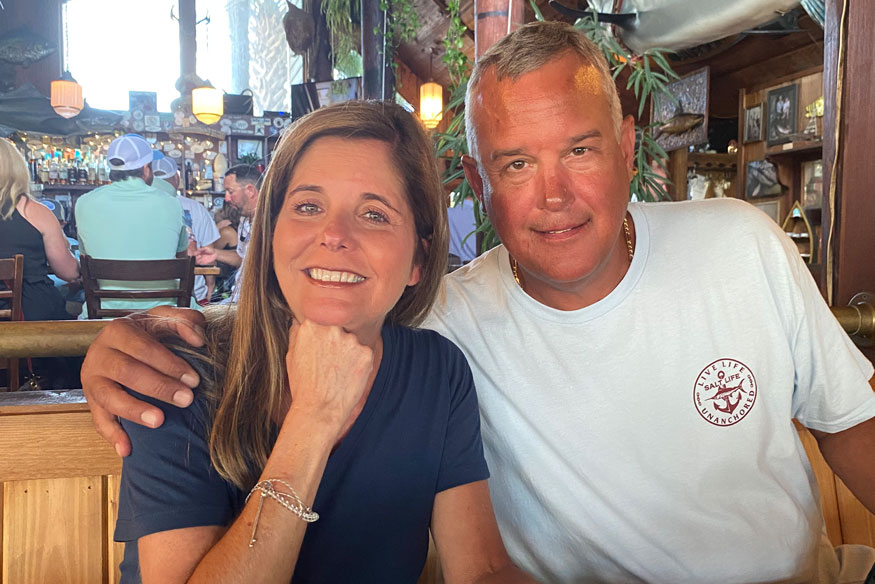Latest News
Community Engagement
I am finally free of them”: Massey’s We CAN Quit program ends South Hill, Va. man’s 35-year history with cigarettes
Nov 10, 2022
 Kyle Jennings (right) used tobacco for 35 years.
Kyle Jennings (right) used tobacco for 35 years.
Kyle Jennings remembers the peer pressure he used to feel in high school. Because of it, he first picked up cigarettes at the age of 16. Smoking occasionally during his teen years eventually progressed to his dependance on tobacco as an adult.
“I primarily smoked cigarettes,” Jennings said. “Although I did use chewing tobacco, or dip, when I played baseball in high school.”
Over 35 years, Jennings tried quitting three times but said it never lasted for very long.
His repeated difficulties defeating nicotine are very common, according to Rashelle B. Hayes, Ph.D., LCP, NCTTP, a member of the Cancer Prevention and Control research program at Massey. Hayes said about 70% of people who smoke express their desire to quit each year; about half will take steps to quit, with even fewer successfully becoming tobacco-free by the end of that year.
“It may be harder to quit smoking than to stop using cocaine, opiates or opioids, or any other drug of abuse,” explained Hayes, who is also a certified tobacco treatment provider and tobacco treatment researcher. “When a person stops smoking, they experience withdrawal symptoms, like irritability, anxiousness or strong cravings to smoke. In addition to this physical addiction, it is difficult to quit because of the psychological or behavioral addiction to tobacco and nicotine. Once a person reduces or quits tobacco products, they have to get used to their daily routines without tobacco and that can be difficult.”
The We CAN (Conquer Addiction to Nicotine) Quit program at VCU Massey Cancer Center is designed to help participants curb cravings and cope with triggers. The free community-based service connects people with “Quit Coaches” and other supportive resources to help them stop using tobacco. In collaboration with both individual community members and partnering organizations, the program educates Virginians on the risks of tobacco use and the substantial health and financial benefits of tobacco cessation.
Jennings learned about We CAN Quit in May 2022, when the Massey Cancer Resource Center (CRC) – Danville set up a booth at the annual employee day at his workplace, Mecklenburg Electric Cooperative.
Jennings, a substation engineer, knew early on that he finally found the help he needed.
“The CRC – Danville mailed me toothpicks and patches, a one-month supply of 21mg and one-month supply of 14 mg,” Jennings recalled. “The CRC also mailed me information containing resources and documentation. We had zoom meetings once a week for a little while.”
Hayes said that a combination of both behavioral counseling and pharmacotherapy, including nicotine replacement therapy (NRT) is the best method to help someone quit. NRT medications approved by the Food and Drug Administration (FDA) include nicotine patches, gum, lozenges, inhalers and nasal spray.
“They primarily work by reducing a person’s withdrawal symptoms by giving a controlled amount of nicotine without giving the person the other dangerous chemicals found in cigarette smoke,” she said. “This controlled amount of nicotine helps satisfy cravings for nicotine and reduces the urge to smoke the tobacco product. These medications sometimes can also be combined with other smoking-cessation medications, like Chantix, Wellbutrin or Zyban, but it is best to talk to your health provider to learn what medication or combination of medications may be best for you.”
While Jennings acknowledged that it was challenging, he is grateful that We CAN Quit addressed both his physical and psychological symptoms of dependence. He knows We CAN Quit helped to save his life.
“I had gone to VCU and gotten a CT lung screening done, and basically I was scared to death after meeting with the doctor to review the scan,” Jennings admitted. “She explained to me that I had the beginning symptoms of emphysema and showed me where I had pneumonia multiple times due to smoking.”
The married father of two has not picked up a cigarette since July 11, 2022 and is already experiencing the benefits of going tobacco-free.
“I feel so much better,” Jennings said. “I am not coughing anymore. My breathing is better. My sense of smell is better. My taste is better, and I am not spending $7 a day on those damn cigarettes. I am finally free of them.”
Members of the community can fill out this form to enroll in We CAN Quit.
Written by: Amy Lacey
Related News
Research & Innovation, Community Engagement
Massey launches Brushstrokes of Discovery art initiative to celebrate the relationship between cancer patients and researchersNov 14, 2025
Research & Innovation, Community Engagement
Former NCI director champions staggering progress in cancer research during visit to MasseyOct 20, 2025

Get access to new, innovative care
Treatments in clinical trials may be more effective or have fewer side effects than the treatments that are currently available. With more than 200 studies for multiple types of cancers and cancer prevention, Massey supports a wide array of clinical trials.

Find a provider
Massey supports hundreds of top cancer specialists serving the needs of our patients. Massey’s medical team provides a wealth of expertise in cancer diagnosis, treatment, prevention and symptom management.
